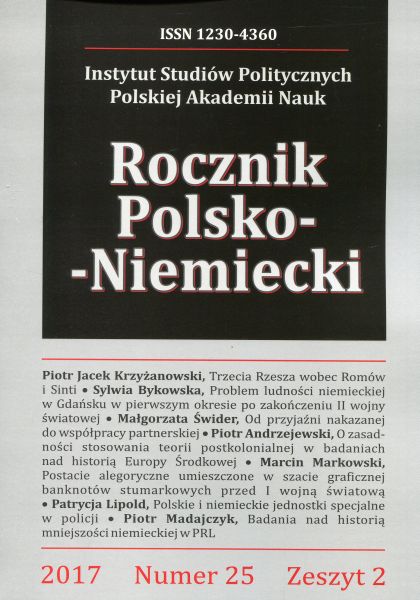Problem ludności niemieckiej w Gdańsku w pierwszym okresie po zakończeniu II wojny światowej
The Problem of the German Population in Gdańsk in the First Period After World War II
Research Reconnaissance
Author(s): Sylwia BykowskaSubject(s): Politics / Political Sciences, Recent History (1900 till today), Fascism, Nazism and WW II
Published by: Instytut Studiów Politycznych PAN
Keywords: post-war Gdańsk; German population; indigenous population; displacement action; nationality policy
Summary/Abstract: This article focuses on the problem of Germans in Gdańsk shortly after the end of World War II. Among the issues analysed are: forced relocations of the German population by the Red Army; the so-called wild expulsion of Germans by the Polish authorities in 1945; the attitude of the Gdańsk administration towards the Germans; relations with Polish settlers from Central Poland and eastern territories incorporated into the Soviet Union. Mistrust, aversion and disputes were parallel to, sometimes, brutal competition for material goods, such as houses and workshops left by previous inhabitants. The Germans were underdogs in this conflict. They understood that they would no longer be responsible for their home city. They lost their position. Not having civil rights, they lost the right to their houses and farms. Gdańsk was an example of a former German city, whose new Polish community was created in the presence of its German inhabitants, who were subsequently deported to the territories on the other side of the Oder River. By this time, the coexistence of the Polish and German populations had evolved from hostility to cooperation between people devastated by war experience and forced migration. An official verification procedure was launched to determine who was a real German or Pole. One had to prove Polish descent and national usefulness in front of the Verification Commission. By the end of 1948, the number of native citizens of Gdańsk accepted as Polish citizens reached nearly 14,000. However, it was not possible to classify instantly all citizens of Gdańsk by their nationality. The memory of the pre-war Free City of Gdańsk was often more important for the collective identity of those who were born and lived in Gdańsk or Danzig before 1939. Both German and Polish citizens of Gdańsk were so strongly linked to their local homeland that they called themselves and were called by others ‘gdańszczanie’ or ‘Danziger’ for many years after the war.
Journal: Rocznik Polsko-Niemiecki / Deutsch-Polnisches Jahrbuch
- Issue Year: 2/2017
- Issue No: 25
- Page Range: 33-54
- Page Count: 22
- Language: Polish

